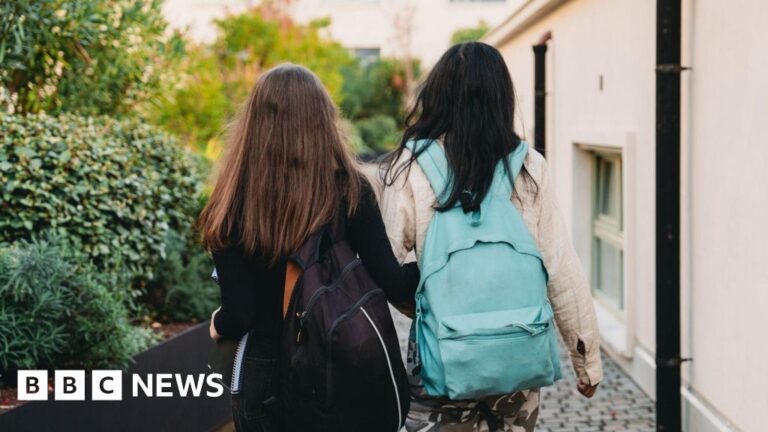Here is the plain text result:
“Toby was so tremendously unhappy in school,” says his father, Daniel. “We were standing outside the classroom door for an hour every morning and he just didn’t want to go in. [It reached the point where] we thought ‘this doesn’t work.'”
Daniel says he tried everything to settle him. Toby, who is now eight, was allowed into the classroom before other children arrived and his teacher also arranged for him to hand out books, but nothing helped.
So, in May 2023 his parents decided to withdraw him from school.
They are not the only ones. Government statistics released on Thursday found that a growing number of parents have withdrawn their children from mainstream education in England. An estimated 111,700 children are being home-educated, based on a census taken this year – marking a 20% rise since last year.
Around 23% say their reasons for home-educating are a result of lifestyle, philosophical or preferential choices, such as religious or cultural beliefs or a rejection of an exam-based education: something that has long been the case.
But 13% of families now say they made this decision because of school dissatisfaction, including a lack of support for special educational needs and disabilities (SEND) and school bullying.
In addition, 14% say it is due to their child’s mental health.
This is the first time the data has become mandatory, which the Department for Education says may account in part for the increase.
Wendy Charles-Warner, chair of home education charity Education Otherwise, says that she is shocked by the increase in the numbers. “It’s not from parents who are wanting to home-educate,” she argues, “but because the school was not meeting their child’s needs, and those parents should not be home-educating, because they don’t want to. Home education is not easy.”
Daniel says that this was the case for Toby. “We had no alternative… the system is broken and does not cater for a lot of children.”
Toby has attention deficit hyperactivity disorder (ADHD), he explains, and requires a very flexible schedule, allowing him to spend a few minutes or a few hours on an activity, or learn “on the move” so he is not confined to sitting at a desk.
Two of Daniel’s older children, who are both autistic, are doing well at a special school but he says that Toby’s educational needs aren’t severe enough to qualify him for a place.
During her first job, in human resources, she struggled to adjust to having a fixed routine. “I felt as though I was losing some of my autonomy in deciding my own schedule”, she says.
However she is positive about the experience overall: “I don’t regret being home-educated at all”, she says. “I think it set me up quite nicely for a career in academia.”
Some critics argue that there are gaps around regulating home-education in the UK. The current rules don’t require a parent to tell the council if they are home-educating their child from the start; they only stipulate that a school must tell the local authority if a child has been de-registered.
“The UK is an absolute outlier in being the least regulated in Europe,” says Daniel Monk, professor of law at Birkbeck, University of London.
The death of 10-year-old Sara Sharif, who was removed from school by her father and stepmother to be home-educated, after her teachers raised concerns with social services, has added to the debate around strengthening regulation.
Dame Rachel de Souza, the Children’s Commissioner for England, said it was “madness” that the law currently allowed parents to take a child out of school when concerns had already been raised.
The government has set out plans to introduce a requirement for families subject to a protection plan to get council permission before removing a child from school to be home-educated.
Earlier this year it also announced plans to introduce a national register in England to help account for all home-educated children. This could come into force in 2025.
Back in south London, Toby’s home education is going well – his father says he is calmer and happier – but he is all too aware that the situation is different for him than for many other families. As he puts it, they have the financial stability to be able to devote this time to educating Toby as a family.
“My wife’s a doctor, we’ve never been financially vulnerable,” he says. “I’m educated, and we’re very, very lucky.”
Source link




